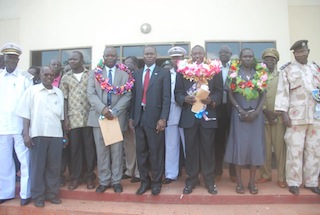W. Equatoria governor appoints two new commissioners
April 3, 2013 (JUBA) – The governor of South Sudan’s Western Equatoria state, Bangasi Joseph Bakosoro, has issued an executive order appointing James Abdulahi Arona and Wilson Thomas Yanga as new county commissioners.

Critics of Adel Sandri, who previously served as Western Equatoria state’s minister of education before his appointed as Maridi county commissioner, was fired on allegations he was involved in signing memorandum of understanding with foreign business companies to log teak trees in the area without seeking approval from the central and state governments.
Paul Tier, who had served as a member of Western Equatoria’s state parliament before being appointed Mvolo county commissioner. While he was an MP his critics made repeated petitions that the official was not available in the area to listen to and respond to constituency issues.
During his time in office he was also accused of not cooperating with local people. It is also alleged that he practiced nepotism when making appointments in the local government.
The two new commissioners were sworn in to their new posts on April 2 in a ceremony attended by governor Bakosoro, state-level ministers and members of the public.
The officials have reportedly pledged to respect the constitution and laws of the Republic of South Sudan and to preserve its independence and territorial integrity, as well as pledging to work hard with the people to embrace collective consultations to implement the government’s commitment to the people.
The newly-appointed commissioner Yanga reportedly said that he had faith in and respect for the country’s constitution and the laws and thanked the governor for the confidence he had shown in them.
He warned that South Sudanese citizens should be aware that they faced conditions that had not been seen for many years, referring to the country’s economic problems since independence from Sudan in 2011.
(ST)
